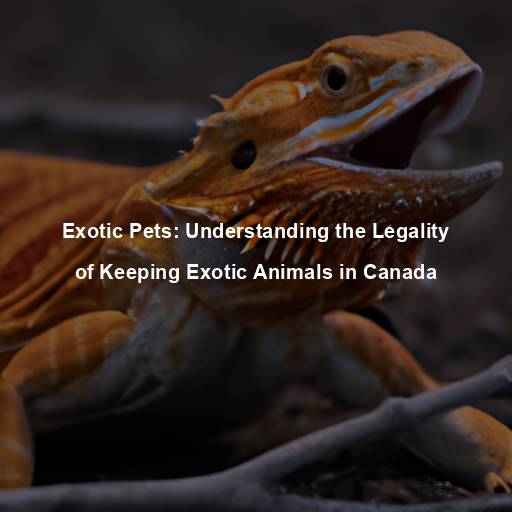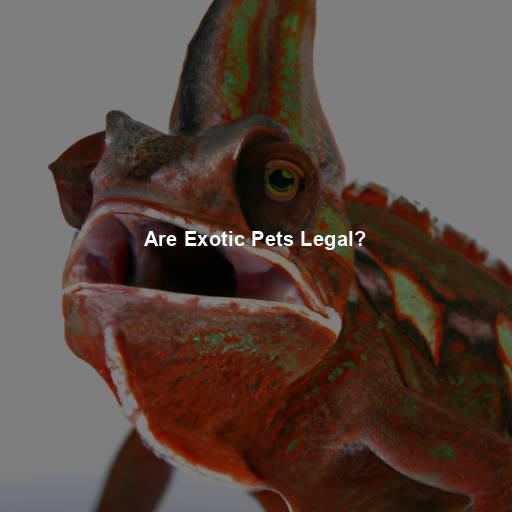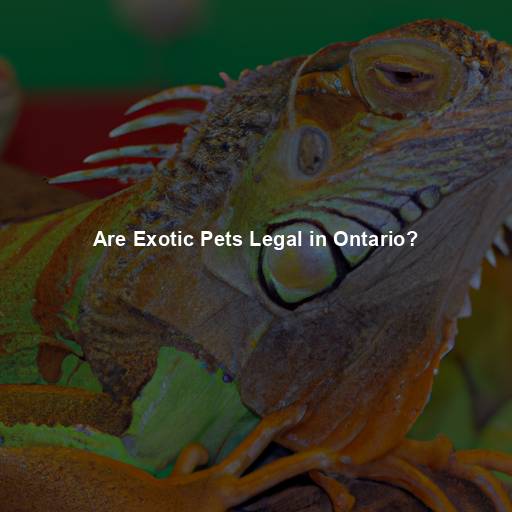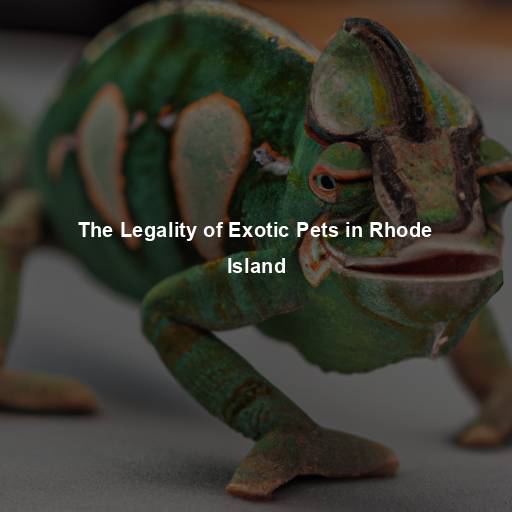Exotic Pets: Understanding the Legality of Keeping Exotic Animals in Canada
Last Updated on October 22, 2023 by Evan
Contents [hide]
- 1 Exploring the Fascinating World of Exotic Pets
- 1.1 Understanding Exotic Pets
- 1.2 The Appeal of Exotic Pets
- 1.3 The Legal Landscape in Canada
- 1.4 Provincial Regulations on Exotic Pets
- 1.5 The Importance of Responsible Ownership
- 1.6 Exotic Pet Ownership: Misconceptions and Realities
- 1.7 Exotic Pets and Conservation Efforts
- 1.8 The Emotional Bond with Exotic Pets
- 1.9 The Role of Exotic Pet Ownership in Society
- 2 FAQs: Exotic Pets Legal in Canada
- 2.1 What is considered an exotic pet in Canada?
- 2.2 Are all exotic pets legal to own in Canada?
- 2.3 Which exotic pets are generally banned in Canada?
- 2.4 Are there any specific requirements to legally own an exotic pet in Canada?
- 2.5 Do I need a permit to own an exotic pet in Canada?
- 2.6 How can I find out if the exotic pet I want to own is legal in my area?
- 2.7 Can I import an exotic pet into Canada?
- 2.8 What are the potential risks of owning an exotic pet?
- 2.9 Can I release my exotic pet into the wild if I can no longer care for it?
- 2.10 Are there any organizations or resources that can provide further information on exotic pets in Canada?
Exploring the Fascinating World of Exotic Pets
Exotic pets have always fascinated humans with their unique characteristics and captivating beauty. From striking reptiles to majestic big cats, these extraordinary creatures have an allure that appeals to many animal enthusiasts. However, the ownership and legality of exotic pets vary from country to country, and it’s essential to understand the regulations governing their possession. In this article, we delve into the topic of exotic pets and explore the laws surrounding their ownership in Canada.
Understanding Exotic Pets
Venture into the fascinating world of unconventional companions with a diverse array of exotic pets. From slithering reptiles to colorful tropical fish, these extraordinary creatures defy the norm of traditional domesticated companions such as dogs and cats. Owning an exotic pet requires a deep understanding of their specialized care, from creating a habitat that mirrors their natural environment to catering to their distinct dietary needs. Embark on an extraordinary journey and immerse yourself in the enigmatic realm of exotic pets.
The Appeal of Exotic Pets
The allure of having an exotic pet stems from the fascination with the extraordinary and the desire to establish a connection with the wild. The rarity and beauty of these animals often attract individuals seeking a more unconventional and captivating pet experience. However, it is crucial to understand that owning an exotic pet comes with a host of responsibilities and considerations.
The Legal Landscape in Canada
Canada is known for its diverse wildlife and strict regulations when it comes to protecting animal welfare. The possession and ownership of exotic pets fall under the jurisdiction of provincial and territorial governments, which means that regulations can vary across different regions. It is essential to research and understand the specific laws in your area before considering an exotic pet.
Provincial Regulations on Exotic Pets
Each province and territory in Canada has its own set of regulations regarding the ownership of exotic animals. While some provinces outright ban the possession of certain species, others may require permits or licenses. Let’s take a closer look at the regulations in some of the major provinces:
Ontario
Ontario has some of the most stringent regulations concerning exotic pets. The province has banned the ownership of several species, including big cats, primates, and certain venomous snakes. Exceptions exist for individuals who owned these animals before the legislation was enacted, but they must comply with specific requirements.
British Columbia
In the breathtaking expanse of British Columbia, a land of natural wonders and untamed beauty, lies a web of perplexing regulations that govern the ownership of exotic pets. With an iron fist, the province demands permits for those daring enough to possess magnificent creatures such as lions and tigers, reminding us that power comes with great responsibility. Furthermore, the allure of primates and venomous serpents is strictly forbidden, unless wielded by the hands of the enlightened, in the name of education or scientific exploration. Amidst this bewildering landscape, British Columbia stands firm, preserving a delicate equilibrium between the wild and the human world.
Alberta
Did you know that Alberta actually allows people to have exotic animals? However, there’s a catch – you need to get permits for certain species. The government has this super comprehensive list of restricted animals, like big cats, primates, and some reptiles. So, if you’re thinking of bringing home that cute little monkey or slithery snake, make sure you follow all the rules and get the necessary licenses.
Quebec
The regulations surrounding the ownership of exotic pets in Quebec may leave some scratching their heads. While the province lacks its own dedicated legislation, it finds itself entangled in a web of federal guidelines. These guidelines, like a strict bouncer at a party, keep certain species like big cats, primates, and venomous snakes on the outside unless accompanied by the proper permits. So, aspiring exotic pet owners in Quebec must navigate this perplexing maze in order to bring their unique companions into their homes.
The Importance of Responsible Ownership
Regardless of the specific regulations in each province, responsible ownership of exotic pets should always be the top priority. Here are some essential considerations for anyone considering an exotic pet:
Extensive Research
Considering the prospect of welcoming an extraordinary companion into your world? It’s imperative to delve deep into the realms of research and arm yourself with knowledge about the particular demands imposed by the species that captivates your interest. These exotic creatures come with a distinct set of requirements – from meticulously curated diets to bespoke habitats and intricate environmental conditions – all pivotal to ensure their holistic flourishing.
Accessibility to Veterinary Care
Finding a veterinarian experienced in caring for exotic pets is vital. These animals often have specific health concerns that require specialized knowledge for proper diagnosis and treatment. Ensuring access to veterinary care is essential for maintaining the health and welfare of your exotic pet.
Ethical Sourcing
When it comes to welcoming an extraordinary companion into your life, ethical sourcing is paramount. The unfortunate truth is that engaging in the illegal wildlife trade not only endangers species but also hampers crucial conservation initiatives. Opting for trustworthy breeders or exploring adoption possibilities through reputable rescue organizations can help ensure a responsible and compassionate approach to acquiring an exotic pet. With these considerations, you can embark on an exciting journey while promoting the well-being of our delicate ecosystem.
Long-Term Commitment
Choosing to bring an exotic pet into your home is no ordinary decision. It embarks you on a journey filled with unfathomable magnificence, intricate responsibility, and a bond that will stand the test of time. These incredible creatures grace our lives with their presence, but in return, they crave unwavering devotion, constant vigilance, and an unyielding commitment to meet their ever-evolving needs, enriching their existence from the moment they step into our reality until their very last breath. Before taking the plunge, pause, reflect, and ask yourself, can you truly provide for their every need, from the first moments of their existence till the very twilight of their being?
Exotic Pet Ownership: Misconceptions and Realities
Owning an exotic pet may seem incredibly tempting, but it’s crucial to dispel some widespread myths and uncover the harsh truths that come with their care. By grasping the complexities and obligations intertwined with exotic pet ownership, aspiring owners can approach their choices with a heightened sense of knowledge and awareness.
Misconception: Exotic Pets are Low-Maintenance
There is a cloud of uncertainty hovering over the perception of exotic pets. Contrary to popular belief, these unique creatures demand a level of dedication and care that surpasses that of traditional pets. Behind their mesmerizing charm lies a world of intricate requirements, ranging from meticulous climate control to tailored diets and elaborate surroundings. Nurturing an exotic pet is like embarking on a perplexing adventure, where adherence to their complex needs becomes an ever-evolving quest.
Reality: Exotic Pets Require Specialized Care
Exotic pets come from diverse habitats and have evolved to thrive in specific conditions. To replicate their natural environment, owners must invest in creating suitable habitats, maintaining appropriate temperatures and humidity levels, and providing a varied and species-specific diet. Additionally, some exotic pets may have unique behavioral and social needs that require careful attention.
Misconception: Exotic Pets are Easy to Obtain
One common misunderstanding seems to revolve around the idea that bringing home an extraordinary pet is an easy task. Sadly, this notion couldn’t be further from the truth. The truth is, embarking on a journey of responsible ownership entails delving into extensive research, diligently seeking out trustworthy breeders or adoption centers, and familiarizing oneself with the intricate legal requirements regarding the desired species.
Reality: Ethical Considerations in Exotic Pet Acquisition
In this rapidly evolving world, it becomes imperative to reevaluate our choices when it comes to acquiring exotic pets. The intricate web of illegal wildlife trade poses a significant threat to both vulnerable species and the welfare of these magnificent creatures. We must navigate the perplexing terrain of sourcing, where ethically acquiring an exotic pet becomes a paramount concern. Supporting responsible breeders and compassionate rescue organizations fosters a positive change, ensuring the well-being and legitimate acquisition of these extraordinary animals.
Exotic Pets and Conservation Efforts
The preservation of delicate species and their natural habitats remains pivotal within the realm of the exotic pet trade. Acknowledging the importance of safeguarding endangered animals, it becomes apparent that conscientious ownership of select exotic pets can provide a distinctive avenue for conservation endeavors. By navigating the intricate balance between preservation and stewardship, responsible pet enthusiasts can actively contribute to the intricate tapestry of species protection. Considering the multifaceted dynamics at play, the exotic pet trade unveils a realm where conservation and ownership intertwine with an enigmatic harmony.
Educational Opportunities
Exotic pets can serve as ambassadors for their wild counterparts. When properly cared for and handled by knowledgeable owners, they can provide educational opportunities for the public to learn about the species, their natural habitats, and the importance of conservation. These interactions can inspire individuals to support and engage in conservation initiatives.
Supporting Conservation Organizations
Many exotic pet owners are passionate about wildlife conservation and actively support organizations dedicated to protecting endangered species. Through fundraising, awareness campaigns, and volunteering, exotic pet owners can make a positive impact on conservation efforts worldwide.
The Emotional Bond with Exotic Pets
The extraordinary connection that exists between humans and their beloved pets is nothing short of awe-inspiring. It boggles the mind to fathom the profound emotional ties individuals can develop with even the most unconventional of creatures. Countless pet owners fervently vouch for the inexplicable bond they share with their exotic companions, leaving skeptics scratching their heads in utter perplexity.
Individual Personalities
Exotic pets, like any other animals, have their own distinct personalities. Through regular interaction, care, and attention, owners can develop unique relationships with their exotic pets. From recognizing their preferences and quirks to sharing moments of companionship, the emotional connection can be profound.
The Joy of Observation
There’s something truly captivating about exotic pets. The way they effortlessly blend beauty and behavior, leaving us in awe and wonder. Their intricate adaptations and mesmerizing interactions with their surroundings are like a doorway to a whole new world, inviting us to unravel the mysteries of nature and find fulfillment in every observation.
The Role of Exotic Pet Ownership in Society
Exotic pets, a subject controversial enough to ignite fervent debates and ignite the clash of opposing viewpoints. For some, these peculiar companions serve as vessels of appreciation, safeguarding enchanting species from fading into oblivion; while others tirelessly raise concerns about the ethical treatment of these creatures and the ecological repercussions of their presence in our midst. Delving into the intricate web of perspectives that intertwine in this discourse can help sculpt a more enlightened conversation, drenched in knowledge and empathy, on the subject of exotic pet ownership.
Balancing Animal Welfare and Individual Rights
Responsible exotic pet ownership involves striking a balance between animal welfare and individual rights. Ensuring that the welfare needs of exotic pets are met should be a priority, and regulations play a crucial role in safeguarding their well-being. At the same time, respecting the rights of individuals who have made informed decisions regarding exotic pet ownership is also important.
The Role of Education and Awareness
Unveiling the mysterious world of exotic pets through education and awareness campaigns holds the power to demolish the walls of misunderstanding that surround these captivating creatures. By presenting a wellspring of precise details on the unique requirements, obstacles, and legal obligations entailed in caring for such pets, we pave the way towards responsible and conscientious ownership. As a society, let us embark on this intriguing journey of unraveling the enigma that exotic pets embody, ultimately mitigating any potential hazards stemming from uninformed and careless guardianship.
FAQs: Exotic Pets Legal in Canada
What is considered an exotic pet in Canada?
An exotic pet in Canada refers to any animal species that is not normally domesticated or commonly kept as a pet. This can include various types of reptiles (such as snakes, lizards, and turtles), amphibians, birds, mammals (like primates, hedgehogs, and sugar gliders), and even certain insects or arachnids.
Are all exotic pets legal to own in Canada?
When it comes to exotic pets in Canada, the rules are as diverse as the creatures themselves. The legality of owning these unique companions is like a patchwork quilt, with each province and territory stitching together their own set of regulations. Some critters are instantly blacklisted, while others can join your family with a little extra paperwork. So, before you bring home that rare creature, be sure to navigate the perplexing maze of permits, licenses, and conditions to ensure your new buddy is on the right side of the law.
Which exotic pets are generally banned in Canada?
While the specifics may vary by province, some common examples of exotic pets that are generally prohibited in Canada include large carnivores like lions, tigers, and bears; certain non-human primates such as chimpanzees and gorillas; venomous snakes; and certain large birds like ostriches or emus.
Are there any specific requirements to legally own an exotic pet in Canada?
Yes, there are specific requirements to legally own an exotic pet in Canada. These requirements may differ depending on the type of animal and the province or territory in which you reside. Some common requirements include obtaining a permit, license, or certificate from the appropriate authorities, providing proper housing and care for the animal, and demonstrating knowledge about the species.
Do I need a permit to own an exotic pet in Canada?
In many cases, you may need a permit to own an exotic pet in Canada. The specific requirements for permits vary depending on the province or territory. Generally, exotic pet permits are required for animals that are deemed potentially dangerous, endangered, or pose a potential threat to public health or the environment. It is important to familiarize yourself with the regulations specific to your location before considering owning an exotic pet.
How can I find out if the exotic pet I want to own is legal in my area?
To determine if the exotic pet you are interested in owning is legal in your area, you should consult the local laws and regulations. Contact your provincial or territorial wildlife authorities, local municipality, or animal control agencies to obtain accurate and up-to-date information regarding the exotic pet species you wish to own.
Can I import an exotic pet into Canada?
Importing an exotic pet into Canada can be a complex process. The Canadian Food Inspection Agency (CFIA) is responsible for regulating the import of animals. The specific rules and permits required depend on the type of animal, its origin, and the purpose of the importation. It is recommended to contact the CFIA or a licensed customs broker to ensure you comply with all the necessary regulations and documentation.
What are the potential risks of owning an exotic pet?
When it comes to exotic pets, there’s a whole wild world of risks lurking beneath the surface. From grappling with the daunting task of meeting their every unique need, to navigating the treacherous road of potential aggression and escape, it’s no walk in the park. But that’s not all, as these extraordinary creatures can also bring a not-so-charming gift: zoonotic diseases, because sharing is caring, right? And let’s not forget about the potential Armageddon they can unleash on local ecosystems if they bid adieu to civilization and choose the untamed life in the wild. So, before jumping on the exotic pet bandwagon, buckle up and ponder these perplexing predicaments.
Can I release my exotic pet into the wild if I can no longer care for it?
Releasing exotic pets into the wild? Not cool, folks. It’s against the law and totally uncool for the environment. These critters can wreak havoc on our delicate ecosystems, messing with the whole balance of nature. If you find yourself unable to handle your exotic pet responsibilities, let’s explore some responsible alternatives. There are qualified facilities and potential new owners out there who could give these animals the proper care they deserve.
Are there any organizations or resources that can provide further information on exotic pets in Canada?
Yes, there are several organizations and resources that can provide further information on exotic pets in Canada. Some helpful sources include provincial or territorial wildlife authorities, local animal shelters or rescues, reputable exotic pet stores, and animal advocacy groups. Additionally, conducting thorough research and consulting with veterinarians experienced in exotic animal care can help you make informed decisions regarding legal and responsible ownership of exotic pets in Canada.







